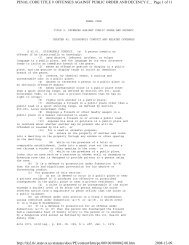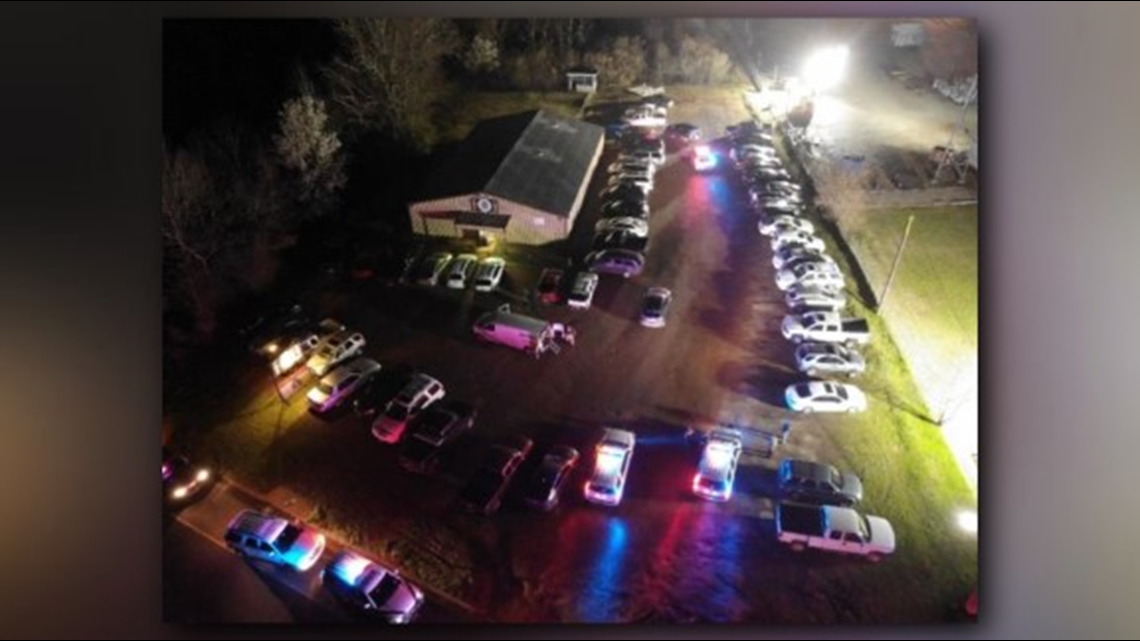Gambling Promotion Texas Penal Code
Online Gambling Laws in Texas
- Gambling Promotion Texas Penal Code Pdf
- Gambling Promotion Texas Penal Code
- Gambling Promotion Texas Penal Code List
- Gambling Promotion Texas Penal Code 2019
Texas Penal Code Title 10, Chapter 47 - Gambling Texas Section 47.01 - Definitions In this chapter: (1) 'Bet' means an agreement to win or lose something of value solely or partially by chance. Texas Penal Code, Chapter 47 - Gambling Felony Offenses in the Texas Penal Code, Chapter 47 Texas law contains more than a thousand crimes, scattered throughout dozens of codes. This webpage focuses on felony-level offenses in the Texas Penal Code. According to Section 47.02 of the Texas Penal Code, gambling is a criminal offense. This means that, according to the law, it is illegal to make a bet on the outcome of a sporting event, game, contest or election for the purpose of paying out money to the winner of the bet. Gambling promotion Communicating gambling information. Texas Penal Code Title 08 Chapter 38 - Obstructing Governmental Operation. Penal Code Chapter 25. The Texas Penal Code, Section 47, prohibits individuals or establishments from receiving “any economic benefit other than personal winnings.” This statute prohibits establishments from taking a cut.

Online gambling is growing in popularity at a fast pace. Many people have encountered online marketing for online casinos or online poker. While some of these games may seem like nothing more than harmless fun, the truth is that they are illegal under most circumstances. Engaging in online gambling may lead to criminal charges and serious penalties.
Laws regarding online gambling may seem confusing because different states can have very different laws on this type of gambling. Also, some states which allow certain forms of offline gambling may criminalize online gambling. Read on for a clear explanation of these laws in Texas.
Is Online Gambling Illegal in Texas?
The laws regarding gambling in Texas are somewhat complex. This is due, in part, to the fact that gambling can take many forms and occur in many places. It’s helpful to take a broad view of the situation and then take a closer look at some of the specifics of Texas gambling laws.
According to Section 47.02 of the Texas Penal Code, gambling is a criminal offense. This means that, according to the law, it is illegal to make a bet on the outcome of a sporting event, game, contest or election for the purpose of paying out money to the winner of the bet. This is a very broad law that prohibits the operation of casinos, gambling dens or bookmaking operations within the state of Texas.
However, there are some exceptions to the law. For example, it is a defense to prosecution if:
- The betting occurred in a private place
- No money was exchanged except for personal winnings
- The odds of winning for all players were evenly matched except for the influence of skill or luck
So, if John and Alice are watching the Super Bowl at John’s house and they each place a bet on the outcome of the game, they are not liable to criminal prosecution. However, if John rents a public building and invites all of his friends to come over and place bets, he may be charged with an offense.
It is also a defense to prosecution to play a game for a reward that is not monetary on a device which is not listed as a gambling device. So, in some ways, games of chance are legal in Texas.
However, this does not always apply to online gambling. Online gambling takes place on the Internet, which is not a private place. It also involves exchanges of money other than paying out winnings and it can involve an element of chance, rather than pure skill. At this time, online gambling is illegal in Texas.
The Problem of Online Gambling
There are several reasons that online gambling is illegal in Texas. Primarily, it is illegal because it violates Texas’ prohibitions on gambling. It is also illegal at the federal level and many other states have banned it.
The major difference between online and offline gambling is that online gambling occurs in a public forum. This is the case with Internet casinos and other games of chance that are hosted online.
Daily fantasy sports leagues have added a new element to this situation. Sites like FanDuel claim that their services are based on skill, not chance. In Texas, a traditional fantasy sports league held in a private home would be likely exempted from prosecution. However, an online fantasy sports league that charges a fee for participation would violate this law because it occurs in a public forum and money is exchanged other than personal winnings.
Legal Penalties
A person who is convicted on a charge of gambling in a Texas court can face significant penalties. A first-time conviction for gambling can result in a penalty of a $500 fine. Business owners who permit gambling on their property may lose their license to operate a business.
People who engage in online gambling may find themselves facing federal prosecution as well. Internet gambling may be a violation of the Wire Wager Act, opening participants up to federal charges.
At the end of the day, placing a public bet on the outcome of an event and paying a fee to participate is classified as illegal gambling in the state of Texas.
Are you currently facing charges for illegal gambling? Matthew Sharp is an aggessive attorney dedicated to protecting the rights of those accused of crimes. Contact his office today at 713-868-6100.
In contrast to other states that have either legalized online gaming or taken significant steps towards doing so, Texas has made no progress whatsoever towards legalizing any type of gaming in the state. There are little to no prospects at the current time for Texas to legalize online gaming. The gambling landscape is Texas is sparse, at least from a legal perspective, due to cultural factors inherent in Texas.
Texas Sports Betting Q&A 2020
Will Texas legalize sports betting?
Where is the closest legal sports’ betting to Texas?
What are the Texas sports betting laws?
Does Texas allow Daily Fantasy Sports?
What are the taxes in Texas on gambling winnings?
Frequently Asked Questions
Will Texas legalize sports betting?Legislation to legalize sports betting is currently on the books, but without a concrete timetable. However, with five professional franchises in the Dallas area and another four in Houston, most feel it is a matter of time. With over 28 million residents, the sports betting market is huge.
Where is the closest legal sports’ betting to Texas?Texans in the western panhandle and in the eastern parts of the state can cross state lines into New Mexico and Arkansas respectfully. These are the two closest physical locations where a Texas resident can legally bet on sports games.

 What are the Texas sports betting laws?
What are the Texas sports betting laws?Under the penal code of Texas, most gambling is illegal. Texas residents can gamble at Native American casinos in the state. Currently, there are ongoing legislative discussions to legalize sports betting, but to date, the law lists it as at least a misdemeanor crime.
Does Texas allow Daily Fantasy Sports?This question depends on who you ask. According to the Texas State Attorney General, DFS contests violate the state’s laws against gambling. There is a pending legal case involving DFS providers who are still accepting Texas residents for DFS contests.
What are the taxes in Texas on gambling winnings?Gambling outside the Native American casinos is illegal in Texas. Pinpointing the tax rate on any winnings is tough. The state doesn’t have an income tax, so to avoid potential tax evasion problems, the best solution is to apply the state’s so-called sin tax on such things as gambling.
What is Allowed and What Isn’t is 2020
Texas is one of the strictest states in the U.S. when it comes to betting laws. In fact, Texas Hold ‘Em is one of the most popular games in the country, but if you gambled on it in Texas, you could face a misdemeanor charge. Under the penal code, any form of gambling is illegal. Gambling is defined in the state law as any bet based on the notion of winning or losing something based purely on chance. Residents are restricted from betting roulette, blackjack, and poker, both at casinos and online, as long as they are in state property.
Gambling Promotion Texas Penal Code Pdf
ContentsThis said, there are three casinos that operate in lands that are Native American territory inside, or just outside, the Texas border where Texas residents can go to gamble. Texas law does not apply to these lands, and therefore, casino gambling is allowed. Texas is very big, so these three casinos may be very far away from you if you live in the state. There is Naskila Gambling, located in eastern Texas in Livingston. About an hour north of Dallas is the WinStar World Casino and Resort located just over the Texas border in Oklahoma, where casino gambling is legal. The third location is in Eagle Pass in extreme southwest Texas at the Kickapoo Lucky Eagle Casino and Resort.
Sports Betting in Texas
Currently, sports betting is not allowed in Texas. This includes mobile online and gambling. However, horse racing and parimutuels betting are legal in the state, and there are tracks throughout where gambling enthusiasts go to and place wagers. Furthermore, DraftKings and FanDuel are allowed to operate in the state, and fantasy sports enthusiasts are allowed to use those websites to play daily fantasy sports games. However, while you are allowed to play daily fantasy sports, there hasn’t been a bill to regulate it yet. FanDuel has taken the more conservative road and has pulled out of Texas.
Is Betting on the Horizon in 2020?
Within the last six months, Rep. Eddie Lucio filed H 1275, legislation that would authorize and regulate sports betting operations, including mobile and online betting, in the state. The bill requires a referendum that would amend the state constitution. If passed, it would then need to be approved by voters in the November election. House Resolution 61 is also on the House floor, which would authorize betting on professional and collegiate sports. In order to be placed on the ballot for voters in November, two-thirds of both the Texas House and Senate must approve Lucio’s bill. While many consider it a long shot in the near future, if more states continue to pass legislation, Texas will eventually be pressured to pass betting legislation for the first time. In other words, as the nation goes, so will Texas.
Existing Gambling in Texas
While other neighboring states are starting to allow gaming outlets, Texas only has three casinos in the state. Commercial casinos are by law not permitted to operate in Texas. Most of the gaming in Texas is centered on the Texas State Lottery and limited horse racing venues. The three casinos in the state are Native American casinos. Two of these casinos have been the subject of protracted litigation in which the state successfully closed the casinos. These casinos restarted operations on their own after the National Indian Gaming Commission issued a legal opinion stating that these casinos were not illegal. The matter is back in court, where the state has again attempted to shutter the casinos. Texas has undertaken numerous efforts over the years to crack down on what it views to be illegal gambling. In addition, various types of poker rooms have been established where the operator charges players “rental fees” so as not to run afoul of restrictions against receiving money from a pot as an organizer of a game of chance.
The act of gambling is not per se illegal in itself in Texas. Residents of the state wager on DFS and through offshore casinos and no enforcement actions have been taken against them. There is nothing that prohibits these activities. Offering gambling as an operator, however, is illegal in Texas, and the restrictions are extensive. However, these restrictions are not necessarily clear, and they are inconsistently enforced. There is enough gray area in Texas gambling laws that creates some uncertainty for operators to devise new types of gaming that may not necessarily be illegal.
Currently, the black market for gambling in Texas is strong. In addition to the poker rooms, there are slots in Texas that operate either in spite of or with the tacit endorsement of law enforcement. One loophole that is exploited is that some slot machines pay non-cash prizes since the illegality is the payment of cash prizes. This loophole originated from the fact that legislators wanted to ensure that amusement machines that awarded prizes would not be considered illegal gambling.
Other slot machines simply operate behind closed doors. Some counties receive tax revenue from licensing slot machines that may or not be violating the law. The case of slots evidences both the vague nature of Texas laws and the amount of gambling that occurs, notwithstanding the prohibitions in the law.
Prospects for Gaming Expansion
Gambling Promotion Texas Penal Code
In addition, there are no efforts underway in Texas that would legalize sports betting. Numerous pari mutual venues have expressed an interest in accepting sports wagers if they were to be legalized. Numerous gambling legalization bills have been introduced in the past, but they have never received a vote in the Texas Legislature. Instead, they have been sent to committee where the bills have died. Even in the event that the bills cleared the legislature, they would likely face a veto from the Texas Governor who maintains his opposition to gambling.
Even legislation that would have legalized and regulated daily fantasy sports in Texas never made it out committee and languished after it was introduced. DraftKings & FanDuel do not operate their daily fantasy product in Texas. At this point, Texans are left to hope that demographic changes in the state could ultimately change the political calculus in a way that would permit online and expanded gaming in the state because the current leadership is intractably opposed. Other neighboring states such as Oklahoma, New Mexico, and Louisiana have expanded gaming regardless of the political bent of those that control the levers of power in the states.
Notwithstanding, studies that show that expanded gaming can have a $1.7 billion impact on the Texas economy, political forces in the state vehemently oppose gaming. The black market in the state is already estimated at close to $2 billion. The bulk of the opposition to gambling is based on moral and religious objections to wagering. In addition to opposition based on moral grounds, some Texas opponents of gambling claim that expended wagering would lead to greater spending on social programs and regulation. Interestingly enough, the Texas Attorney General signed a legal brief supporting New Jersey in the case of Murphy v. NCAA, but his support should not be interpreted as an endorsement of gambling. Instead, he viewed the federal ban on sports wagering as an encroachment on state’s rights.
It is unlikely that legal gaming expansion will come to Texas anytime soon, and little can change that reality even though gambling is already occurring. Perhaps if the state receives evidence that Texas residents are traveling outside of the state to gamble, a movement would begin to expand gaming in Texas to keep revenues within the state. That, however, is doubtful to occur. As is, Texas is losing potential revenues as its residents are betting offshore and illegally within the state, and that revenue could be taxed. Control of the state government would need to change hands at this point in order for gambling to be expanded in any form in the state. The best possible outcome for gambling proponents at this point is that voters are able to decide the question of gaming expansion in a referendum.
Free Betting News & Bonus Offers